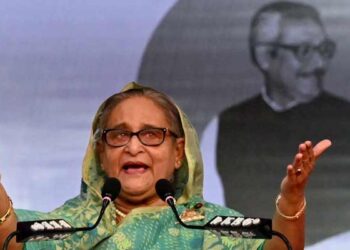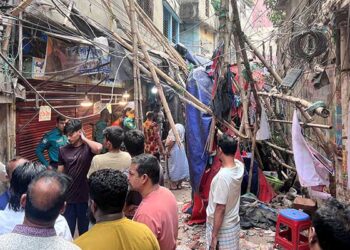Select Language:
Hundreds of Muslim men, women, and children seek refuge beneath a sea of blue tarps in a corner of northeastern India near Bangladesh. They have been displaced and are now taking shelter in a temporary camp in Goalpara district, following recent evictions by authorities. This surge of demolitions marks the most aggressive action in decades, targeting families accused of unlawfully occupying government land.
In Assam, where Prime Minister Narendra Modi’s Hindu nationalist party is preparing for next year’s re-election, authorities have carried out widespread demolitions. These actions align with a nationwide crackdown on Bengali-speaking Muslims, branded as “illegal infiltrators” from Bangladesh, especially since Bangladesh’s pro-India prime minister was ousted in August 2024.
Aran Ali, 53, stands outside a bare patch of earth that now houses his family of three, lamenting, “The government keeps harassing us.” Born in Assam, Ali claims they are accused of being encroachers and foreigners. The scorching July sun beats down on the settlement, which was once part of Assam’s long-border region with Bangladesh. Assam’s border extends for over 262 kilometers of India’s total 4,097-kilometer boundary with Bangladesh, a region historically plagued by anti-immigrant sentiments out of fears that both Hindu and Muslim migrants from Bangladesh could overwhelm local culture and economy.
The recent focus of the government, under the BJP, has been exclusively Muslim populations, leading to protests that recently resulted in the death of a teenager. Assam’s fiery Chief Minister Himanta Biswa Sarma asserts that “Muslim infiltrators from Bangladesh” threaten India’s identity. On social media platform X, Sarma claimed that “We are fearlessly resisting the ongoing, unchecked Muslim infiltration from across the border, which has already caused an alarming demographic shift. In many districts, Hindus are now on the verge of becoming a minority in their own land.” According to the 2011 census, Muslims and Hindus now make up significant portions of Assam’s 31 million residents, with Muslims constituting about 30%. Sarma predicts that minority populations in Assam could reach nearly 50% within a few years.
The BJP’s belief that Hindu-majority India is the natural homeland for all Hindus has driven policies aimed at reducing the Muslim population. In 2019, the government amended citizenship laws to facilitate the naturalization of non-Muslim migrants from neighboring countries. Since Sarma became chief minister in 2021, roughly 50,000 people—primarily Bengali Muslims—have been evicted from 160 square kilometers of land, with more removals planned. Over the past month alone, approximately 3,400 Bengali Muslim homes have been razed across five eviction drives, adding to the 4,700 families displaced under the previous government.
Praveen Donthi, a senior analyst at the International Crisis Group, highlights that “Bengali-speaking Muslims, regardless of their legal status, have become vulnerable targets for right-wing groups in India.” Critics, including opposition figures, argue that these actions are politically motivated to polarize voters ahead of upcoming elections. If the opposition Congress party regains power, it vows to rebuild demolished homes and hold accountable those responsible for the destruction.
The crackdown follows a deadly attack on tourists in Indian-administered Jammu and Kashmir in April, which was blamed on terrorists from Pakistan—a claim Islamabad denies. Since then, BJP-controlled states have detained thousands of Bengali Muslims, labeling them as suspected illegal immigrants and potential security threats.
Experts believe that worsening relations between India and Bangladesh—especially after Bangladesh’s government was ousted—have fueled anti-Muslim sentiment. Bengali is Bangladesh’s primary language and is also commonly spoken in parts of India, including Assam. The government has been deporting and pushing back Bengali Muslims into Bangladesh, and some have been returned after court challenges to their Indian status. Authorities in Assam have also declared around 30,000 individuals as foreigners, many of whom are long-term residents with land and families, often wrongly branded as illegal immigrants due to flawed classifications.
India estimates that about 20 million undocumented Bangladeshi migrants live within its borders. Critics like Elaine Pearson of Human Rights Watch argue that these deportations and crackdowns risk endangering vulnerable communities while disproportionately targeting Muslim populations, reflecting broader discriminatory policies. The Indian government has a list of over 2,300 individuals slated for deportation to Bangladesh and has encouraged Bangladesh to expedite verification procedures. Bangladesh has not provided an official comment on these efforts.
Following the recent political upheavals and attacks in Bangladesh, Prime Minister Sarma frequently shares images of intercepted infiltration attempts on social media, fueling nationalist narratives. Analyst Donthi notes that “The long-standing ethno-nationalist politics in Assam has become deeply intertwined with the religious nationalism promoted by the BJP, shifting blame from Bengali outsiders to specifically Bengali-speaking Muslims.”







